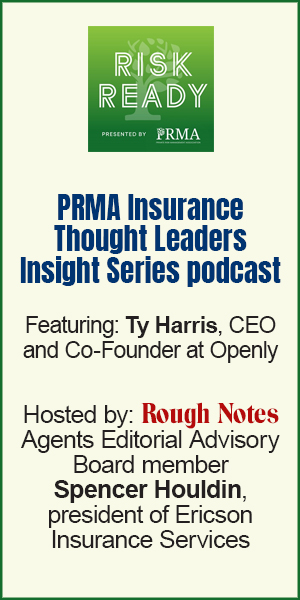SHIFTING THE RECRUITMENT NARRATIVE
What agencies can learn from insurtechs about attracting millennial and Gen Z talent
By Philip Charles-Pierre
“Because it’s insurance.” This is the response one of the newer employees at my company gave when I asked him why insurance never interested him before he started working at an insurtech. I didn’t need him to say more. I knew from his tone what that statement meant: He viewed insurance as boring and outdated.
This point of view isn’t uncommon. At our company, we have two advantages. We can focus on the fact that we are a startup located in New York—which was a selling point before the pandemic—and on the technology we bring to market.
But independent agencies and brokerages that have traditional operations don’t have the luxury of using trending labels, such as insurtech or startup. They have to find a way to overcome perceptions of the industry’s reputation by shifting the narrative.
There’s a real lack of awareness among millennials of the opportunities in insurance. As another colleague shared, “I really didn’t know anything about the vast array of insurance products and career options within the industry. And everything you hear about insurance from your parents, TV shows, and other media sources is not all that exciting or interesting.”
Recruiting the next generation of talent is important for the longevity of an agency. … As millennials and Gen Z become the next big market for insurance products, agents from the same demographic will have insight into how they like to be targeted and do business.
Recruiting the next generation of talent is important for the longevity of an agency. New employees will be needed as long-term team members retire. Adding such talent also helps grow business. As millennials and Gen Z become the next big market for insurance products, agents from the same demographic will have insight into how they like to be targeted and do business. For example, most people in their twenties and thirties abhor phone conversations. They would rather text or do a video chat.
So how can agents convince recruits that insurance is a great industry and, in so doing, better attract talent from every age group? Here are four things that have worked for us:
Focus on making a difference. Younger employees want to feel good about where they work—that they are making a difference to people. Unfortunately, there is a misperception among millennials and Gen Z that insurance companies take people’s money but are not there when customers need them.
Agents can use this mischaracterization to their advantage. Agents thrive because of their personal customer care. They help clients on some of the worst days of their lives. That’s very meaningful and compelling. But many insurance agents have not done a good job conveying this idea to recruits.
When a crisis strikes, many people call their insurance agents. They might be helping an insured submit a claim for a home destroyed by a tornado. Or they may be helping a small business owner get back to business after a break-in. The point is that working at an agency is incredibly important work, yet younger generations don’t know this.
At our company, new people may walk in the door because we’re a tech start-up. But what really motivates our employees—what gets them excited to go the extra mile—is that they’re helping to create a product that makes people’s work easier.
When you are trying to engage talent at a recruiting event, try opening with: “You will make a difference in people’s lives, giving them peace of mind about their business and their family’s well-being.” It can change the whole level of conversation.
Highlight the potential for innovation. I’m a firm believer that many of the perceptions that insurance is too traditional and not creative are shortsighted. Insurance was the original early adopter of using data and predictive analytics. It is how insurers have been able to develop risk profiles. In fact, it’s exciting today to see all the innovation in our sector racing to build tools that can better leverage this data.
To some extent, all businesses must become technology businesses today. Agencies and brokerages are no different. This is an important point that can be leveraged in your recruiting discussions. Accentuate the technology solutions that are part of how you serve clients. Promote the tools that you use, from your agency management system to automated quoting to e-signatures. This will help dispel the idea that employees at your agency are shuffling paper all day.
Tie your digital capabilities back to your commitment to serving clients. Illustrate how these solutions cut out manual processes so agents will have more time to work with customers on their insurance needs.
If you are still working on digitally transforming your operation, this too can be a selling point. Let recruits know that they can be part of the process, suggesting solutions and making recommendations on how your agency can reach customers and operate more efficiently.
Extend your search beyond the usual outlets. If you limit your talent search to only those with an insurance background or degree, your pickings may be slim. One of the great things about insurance is that people with diverse backgrounds can excel. Because products can be specialized—especially in small commercial lines—having someone on board who has hands-on experience in a particular niche could be a winning strategy.
At Semsee, we have people from diverse backgrounds including travel, finance, and real estate. We look for people with experience that translates well to insurance, and we also look for people from sectors that have leveraged technology, so they can apply that experience to help advance insurance.
Our current economic environment presents a prime opportunity for agencies to attract non-traditional recruits. For example, if you’re looking to specialize in a small commercial lines niche like independent gyms or breweries, a personal trainer or brewery owner might currently be unemployed due to the shutdown. Their inside knowledge of the sector you are targeting could be extremely valuable, and you can teach them insurance.
Don’t forget the perks. Office perks—at least when people were going into the office—represent an added bonus and can help differentiate you from other businesses going after the same candidates. At our office, we have a large kitchen full of a variety of snacks and food items.
Hosting a monthly agency-wide breakfast or lunch is a nice treat and can give your staff time to come together. Also, some agencies we work with have office mascots—perhaps beloved pets of the owners or other employees.
Even in today’s current remote working environment, you can get creative with perks. Maybe once a month you end the workday early and do an office Zoom happy hour or hold a contest for the best remote workspace. These activities can make your agency feel like it is not just a workplace but a family, and it clearly demonstrates your office culture.
What can you say to convince a millennial or Gen Z candidate that working in insurance is a good career move? Another colleague of mine has a great answer: “I would tell them that insurance is a really broad field and knowledge of insurance is always useful no matter what field you go into. You can gain the same technical and logical skills in insurance that you could get in finance, without the repetition of daily, weekly, monthly, and yearly tasks.”
I would add to that that insurance, especially agents and brokers who provide personal customer service, deliver value to consumers and help them during some of the most difficult times of their lives. By focusing on purpose and the potential for innovation, we can switch the narrative and hopefully one day when the next generation is asked why they work in insurance, they will respond with pride, “Because it’s insurance.”
The author
Philip Charles-Pierre, CEO of Semsee, an automated small commercial quoting solution for agents, has a long background of creating digital solutions to help small and mid-sized businesses. Before joining Semsee, he was senior vice president of distribution for Smarter Agent, a mobile search and discovery tool used by leading real estate franchises such as CENTURY 21, Sotheby’s, Keller Williams, Berkshire Hathaway, and ERA. In addition, Philip has worked at Site59, Travelocity and Starwood Hotels, where he focused on building B2B platforms.





